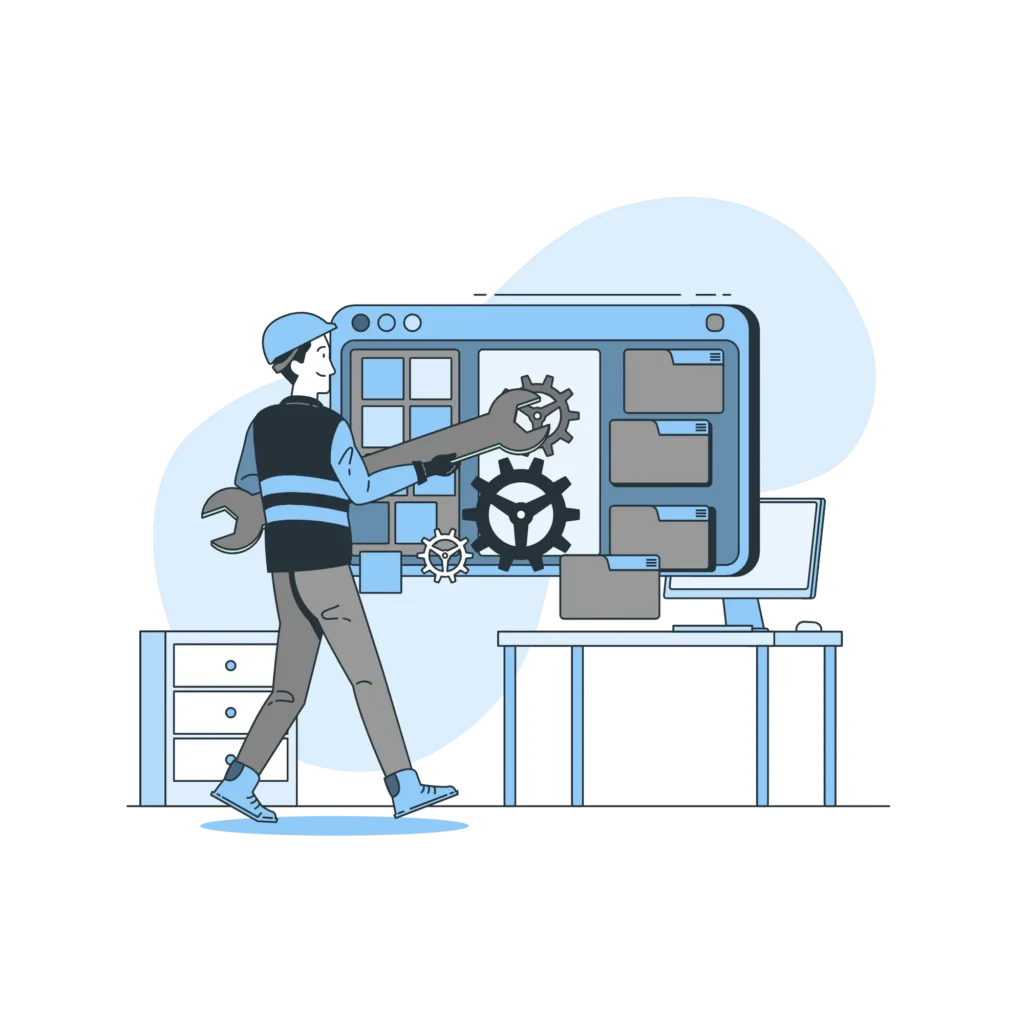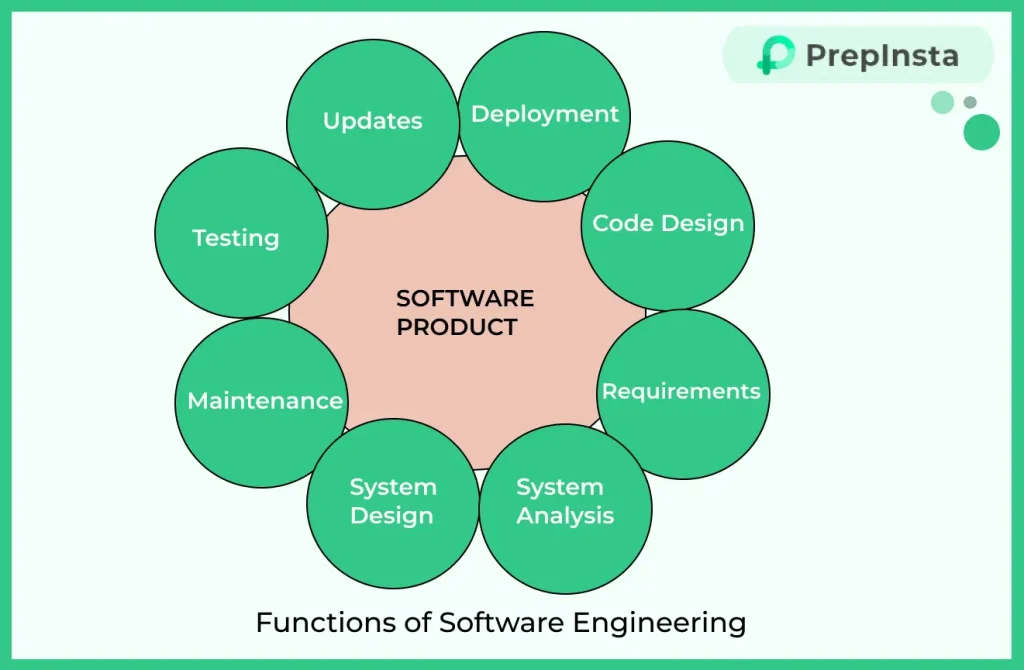Introduction to Software Engineering
Introduction to Software Engineering
Software engineering is the process of designing, creating, testing, and maintaining software. In this Introduction to Software Engineering page, we discuss advantage, disadvantage and many more.
It involves applying principles and techniques from computer science, project management, and other fields to the design, development, testing, and evaluation of software systems.
Software engineering is a crucial part of the software development process, as it helps to ensure that software is developed in a systematic and consistent manner, with a focus on
- Quality
- Reliability
- Maintainability

Table of Contents
- What is Software Engineering?
- Key Principles of Software Engineering
- Main Attributes of Software Engineering
- Dual Role of Software Engineering
- Objectives of Software Engineering
- Program vs Software Product
- Characteristics of Software Engineering
- Applications of Software Engineering
- Goals in Software Engineering
- Advantages of Software Engineering
- Disadvantages of Software Engineering
- FAQs on Software Engineering
What is Software Engineering?
Software engineering is the process of designing, creating, and maintaining software using organized and systematic methods. It involves planning, writing code, testing, and updating software to make sure it works well, meets user needs, and can be easily maintained and improved over time.

Key Principles of Software Engineering
Following are the key principles of SE(Software Engineering) in Introduction to Software Engineering in a concise way :
- Modularity: Modularity means break the system into small, manageable pieces. Each piece handles a specific part of the job, making it easier to build, test, and fix.
- Abstraction: It is used to hide the complicated details and show only the essential features. This keeps things simple for users and developers.
- Encapsulation: Encapsulation means grouping of data and the functions that work on it together. This makes it easier to manage and protects the data.
- Separation of Concerns: It is used to divide the system into distinct sections, each handling a specific task. This makes it simpler to manage and develop different parts.
- Reusability: It means creating components that can be used in different projects. This saves time and effort by avoiding duplicate work.
- Maintainability: Design the software so it’s easy to update and fix. Use clear code and organize it well to make changes smooth.
- Scalability: Ensure the software can handle more users or features without major changes. This allows it to grow and adapt as needed.
Main Attributes of Software Engineering
Following are the main attributes of Software Engineering Introduction to Software Engineering in which Software Product mainly focus on:
- Maintainability: How easily the software can be updated, fixed, or improved over time.
- Portability: The software’s ability to run on various platforms or environments with minimal changes.
- Scalability: The software’s capacity to manage increased workloads or to be expanded with new features.
- Security: The measures in place to safeguard the software from unauthorized access, breaches, and other security threats.
Dual Role of Software Engineering
In this Introduction to Software Engineering, Software Engineering play dual role :
As a Product
Software uses the hardware’s computing power to provide useful functions and transforms information by creating, managing, changing, showing, or sending data.
As a vehicle for delivering the product
As a vehicle for delivering a product, software offers key functions (like managing payroll), controls other programs (such as operating systems), and helps create additional software tools.
Objectives of Software Engineering
Objective of software engineering depends on the following factors:
- Customer Satisfaction: It is used to create software that truly meets what users need and expect.
- Cost Efficiency: The most important objective to keep development and maintenance costs as low as possible.
- Timeliness: As per the Software, it is used to deliver on time, as promised.
- Quality: It is used to ensure the software works reliably and is free of bugs.
- Maintainability: Software are always built on the principle of easy to update and expand the software when needed.
Program vs Software Product
Program:
- A program is a set of instructions designed to do one specific job or solve a particular problem.
- It’s usually made for a particular purpose and is limited in what it does.
- It can work on its own and might focus on something simple, like a calculator or an automation script.
- Programs are generally straightforward and don’t need much documentation or support.
Software Product :
- A software product is a complete solution meant for a wide range of users or businesses.
- It includes the main program plus extra features, user interfaces, documentation, and support services.
- It’s built to address broader needs and comes with updates, customer support, and maintenance.
- Examples are operating systems, office suites, and enterprise software.
Characteristics of Software Engineering
Following are the characteristics of Software Engineering :
- Systematic and Disciplined:
- Follows structured processes and methodologies to ensure quality and consistency.
- Focus on Quality and Reliability:
- Aims to build software that is dependable, secure, and meets user requirements.
- Team Oriented and Collaborative:
- Involves teamwork, communication, and coordination among developers, testers, and stakeholders.
- Continuous Improvement and Maintenance:
- Includes regular updates, bug fixes, and adapting to changing needs over time.
Applications of Software Engineering
Following are the applications of Software Engineering :
- Business Applications: Enterprise resource planning (ERP), customer relationship management (CRM) systems.
- Web Development: Websites, web applications, and e-commerce platforms.
- Mobile Development: Apps for iOS, Android, and other mobile platforms.
- Embedded Systems: Software for devices like smartphones, automobiles, and medical equipment.
- Gaming: Development of interactive games for various platforms.
- Scientific Computing: Software for simulations, data analysis, and research.
Goals in Software Engineering
The goals of software engineering are to produce high-quality software that is reliable, efficient, and easy to maintain, while also being developed in a way that is cost-effective and meets the needs of the users.
Some specific goals of software engineering include:
- Producing software that is reliable and free from defects
- Developing software that is efficient and performs well
- Creating software that is easy to maintain and modify
- Developing software in a cost-effective manner
- Meeting the needs of the users
Advantages of Software Engineering
Software engineering is the process of designing, developing, and maintaining software systems. It involves applying engineering principles and practices to the design, development, and maintenance of software. Some advantages of software engineering include:
Improved quality:
Software engineering practices, such as testing and debugging, help to ensure that software is of high quality and reliable.
Greater efficiency:
Software engineering practices, such as using modular design and code reuse, can help make the development process more efficient and reduce the time and cost of developing software.
Better management:
Software engineering practices, such as using project management methodologies and tools, can help to better manage the development process and improve communication and collaboration among team members.
Enhanced security:
Software engineering practices, such as secure coding practices, can help to improve the security of software systems and protect against threats such as hackers and malware.
Increased flexibility:
Software engineering practices, such as using modular design and abstraction, can help to make software more flexible and easier to maintain and update over time.
Greater scalability:
Software engineering practices, such as using efficient algorithms and data structures, can help to make software more scalable and able to handle larger workloads.
Disadvantages of Software Engineering
Software engineering can be a demanding field, and it is not without its challenges and disadvantages. Some of the potential drawbacks of working in software engineering include:
Wrap up
Software engineering ensures systematic development of reliable and efficient software systems. It blends engineering principles with computing to deliver high quality, scalable solutions.
- Improved quality and reliability: Ensures software is tested, debugged, and meets user expectations.
- Better project management: Uses structured methods to enhance team coordination and workflow.
- Increased flexibility and scalability: Modular design allows easy updates and handles growing demands.
- Enhanced security and maintainability: Secure coding and clear structure simplify future maintenance.
FAQs
Software engineering is the structured approach to software creation, covering the full lifecycle.
Programming is mainly about writing code to solve specific problems.
The main SDLC phases are: requirement analysis, design, coding, testing, deployment, and maintenance.
Each phase helps ensure quality and efficiency in software development.
Good software is functional, reliable, user-friendly, efficient, maintainable, and portable.
It meets user needs and performs well across environments.
Get over 200+ course One Subscription
Courses like AI/ML, Cloud Computing, Ethical Hacking, C, C++, Java, Python, DSA (All Languages), Competitive Coding (All Languages), TCS, Infosys, Wipro, Amazon, DBMS, SQL and others




Login/Signup to comment